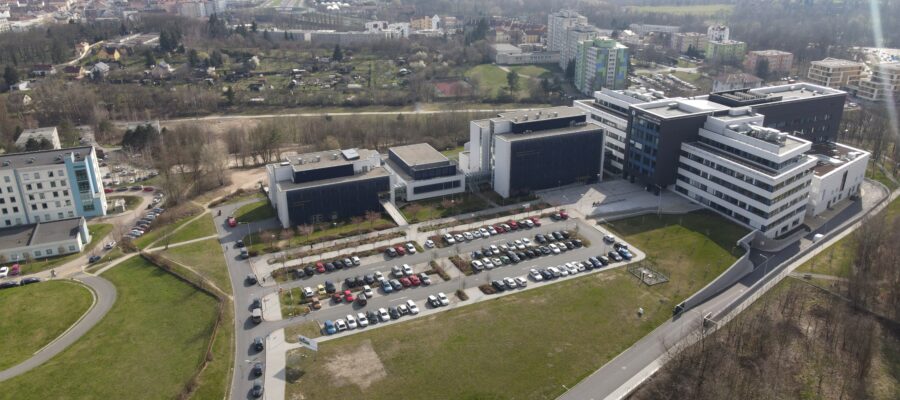
Changes in the operation of parking areas on the LFP campus have raised questions and requests for clarification of some actions and measures. We are very grateful to the secretary Ing. Maria Klečková and Bc. Ondřej Topinka, Security Specialist at LFP UK, for answering the most common questions related to the topic of parking.
There is often criticism from students about the parking changes. Why is the faculty’s management currently paying so much attention to this topic?
O. Topinka: We have now had more than a year of verification operations, when we are finding out facts that were very difficult to prepare for in advance. Unfortunately, many of these experiences are not all positive. As a faculty, we have our own parking spaces for students for the first time ever. It has to be said that this is a great exclusivity, as it is not the norm for faculties or universities to have their own parking lots. Another significant circumstance that has undoubtedly influenced the adjustments to the setup is the tragic event in December, which has increased the demands on security provision. It is in our common interest to provide a safe environment, and this requires certain restrictions in principle.
Based on the experience gained, the occupancy of the car park, the analysis of safety risks and, unfortunately, the repeated violations of the rules by car park users, we can now proceed with changes that will lead to the standardisation of faculty parking in order to prevent problems and ensure a smooth operation for all users in the future.
A faculty Instagram post asked why there was a ban on student parking in the underground garage.
O. Topinka: While the constant presence and movement of people breathes the campus with its now typical life, it also carries with it certain security risks (e.g. at entrances to the building out of sight of security guards). We try to preserve this freedom of movement and campus life as much as possible and sustainably, while at the same time gaining as much visibility as possible of who is on campus and when. This effort has translated, for example, into the closing of night study halls, limiting campus hours, and at the same time distributing parking zones among faculty staff and students. Underground parking garages are inherently a riskier space than outdoor parking lots; they represent a limited controllable entrance to the building, and therefore it is necessary to limit the number of people who can enter and exit them.
The criticism was made that this is only to allow staff to have more parking spaces.
O. Topinka: Outdoor parking is for students only. Employees are not allowed to park here. All faculty employees, including visitors, park in the garages. It should be said that a visitor is often an entire delegation of people traveling in more than one vehicle. In order to keep the movement of visitors under as much control as possible and to prevent strangers from loitering on campus, a number of additional measures and tools now apply to parking in the garages.
Students often complain that parking spaces are scarce and there is nowhere to park during the day.
O. Topinka: The campus has the maximum number of parking spaces it can, given the size and nature of the surrounding area. However, it cannot be assumed that it will be sufficient in capacity if everyone chooses to drive. There is no more we can do on our part to provide student parking directly at the college. There is definitely a need for collegiality among students, for example, not to abuse the parking space for long-term parking and overnight parking, which is now happening. It is always advisable to consider whether it is really necessary to choose to drive to campus, or whether it is possible to park off campus within walking distance if time and other conditions permit.
Does the college have any recourse for drivers who park outside of parking spaces?
O. Topinka: We have been very benevolent in this so far. This has changed with the drafting of the traffic regulations, which clearly declare where and under what circumstances vehicles are allowed to park. Anyone can get acquainted with the operating regulations on the official board, which is located on the faculty website. Students and faculty staff have also received numerous emails from the Dean clearly declaring where parking is and is not allowed and what the possible penalties are. It is not infrequent that vehicles are parked in violation of the regulations in force and prevent, for example, the arrival of vehicles of the integrated rescue system. It is important to remember that inconsiderate parking has wider implications than just breaking traffic regulations. As far as penalties are concerned, the police have the right to do this directly on the driveway. In parking areas, we try to deal with the situation by warning first. If the situation is not rectified, we will proceed to tow the vehicles. Violations of the rules directly in the parking lot will result in future bans for the vehicles and their users.
How does the faculty issue warnings?
O. Topinka: We use stickers to inform drivers about inappropriate parking space selection. We are trying to appeal to drivers not to repeat the same situation in the future. In some cases, we ask them to re-park immediately via faculty radio. The system also alerts us to vehicles that do not leave the car park at night. Thanks to a modern access and camera system, we have a constant overview of which vehicles are in the car park and for how long.
You announced that a fee would be charged for parking. Will that really be the case?
M. Klečková: Yes. A fee will be charged for parking. Faculty employees will be obliged to pay it from April this year, and students will be obliged to pay it according to a pre-approved schedule from 1 October 2024 for the entire following academic year. There are a number of reasons for this move. Parking at the school, especially right next to the University Hospital, is indeed a highly superior service that is not common at other faculties. Yet the rules for its smooth and considerate use are repeatedly violated. Someone has to deal with these situations and come up with the tools to prevent them, which are initially unplanned extra costs, both personnel and technical. The fee will be annual and not high (for the first period it will be 500,-CZK). It will be used for activities related to the maintenance and operation of the car parks and improving security. With the fee we will also get the registration of number plates and thus a better overview of the owners of the parked vehicles. It will also minimize unauthorized entries and possible repeat offenders can be restricted from parking.




